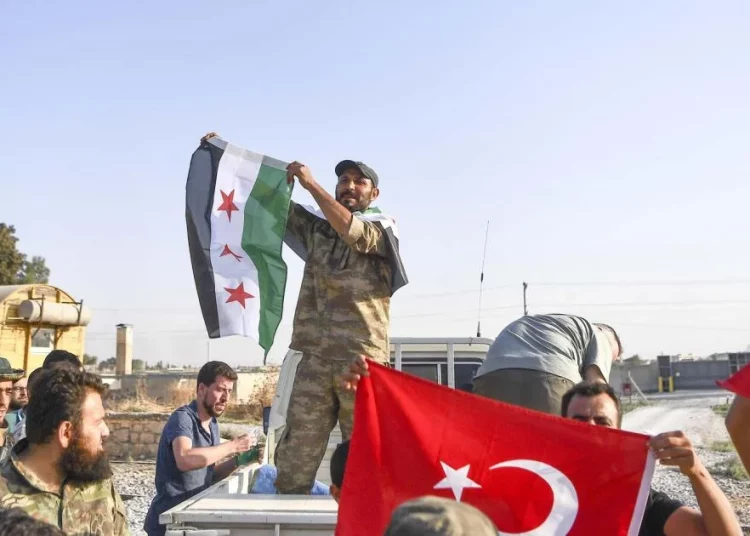Levent Kenez/Stockholm
There are reasonable grounds to believe that the use of unguided explosive weapons to strike urban areas and villages amounts to the war crime of launching an indiscriminate attack causing death and injury to civilians, the UN Independent International Commission of Inquiry on the Syrian Arab Republic said in a report published on September 14, referring to mortar shells that may have been fired from Turkey and several drone attacks killing civilians at various times in 2022.
The 50-page report states that the violation of rights perpetrated by all armed actors on Syrian territory were documented. It emphasized that rights violations such as attacks on civilians and civilian settlements, restrictions on freedom of expression and the forcible confiscation of private property are continuing. The report underlined that many of these violations can be considered war crimes.
Turkey’s continuing military presence in Syria, its military attacks on targets in the north of the country and human rights violations committed by the forces supported by Turkey were also covered extensively in the report.
“In areas under effective Turkish control, Türkiye has the responsibility, as far as possible, to ensure public order and safety and to afford special protection to women and children,” experts from the Independent International Commission of Inquiry on the Syrian Arab Republic said in their latest report.
The commission documented three mortar attacks and a drone strike that killed civilians between January 1 and June 30. According to the UN experts, on January 8 three locations in the center of Ayn al-Arab were simultaneously shelled, along with villages to the east of Ayn al-Arab along the Turkish border. One civilian man was killed and 12 were injured (four men, five women and three children), including a 4-year-old child who lost a leg. Civilian property was also severely damaged, affecting a market and food production facilities. The report states that “photographs of remnants from one of the villages where civilians were injured indicates the use of unguided 120 mm mortars, which, given the range of the weapon, may have been fired from Türkiye.”
The Turkish army was also accused of failing to take adequate precautions to prevent civilian casualties in drone attacks.
The report noted that the Turkish army and the Turkish-backed Syrian National Army seized the houses and fields of civilians for military purposes and that no attempt was made to compensate for the damage in return.
“In Dawouydia village (Ras al-Ayn), located less than 10 kilometers from active frontlines where fighting between the Syrian Democratic Forces, Türkiye, and the Syrian National Army recently intensified, brigades of the Syrian National Army and Turkish ground forces continued to use civilian properties for military purposes. Recent satellite imagery confirmed the continuous presence of a Turkish military base inside the village, including a possible expansion of the facility to the north. … The failure of Turkish forces to provide payment for the requisitioning of private property may amount to a violation of international humanitarian law,” the UN commission stated.
According to the report, credible new accounts were also gathered from both male and female survivors, including minors, of beatings and other forms of torture by members of the Syrian National Army, including rape and other forms of sexual violence that took place in makeshift detention facilities between 2018 and 2021. One woman, a former detainee, described how she was subjected to rape and other forms of sexual violence in 2018 during interrogations by individuals wearing Turkish uniforms and speaking in Turkish.
Some of the people interviewed by UN experts who contributed to the report said their relatives who were arrested by factions and individual members of the Syrian National Army were held incommunicado for periods ranging from one month to three years and that that family members were denied information about the whereabouts of detainees, including detainees transferred to Turkey. Until now, Turkish authorities have not shared any information that detainees captured in northern Syria were brought to Turkey.
The commission notes that some neighboring countries are creating concrete plans for the mass return of Syrian refugees; however, the report concludes that the Syrian Arab Republic is still not a safe place to return to.
“Returns must be a choice and take place in a safe, dignified, and voluntary manner,” Commission Chair Paulo Pinheiro said in a statement published by the UN.
Meanwhile, Turkish media claimed that the head of Turkey’s National Intelligence Organization (MİT) met with his Syrian counterpart, Ali Mamlouk, in Syria and discussed the return home of Syrians who have taken refuge in Turkey,
Before the upcoming elections, the government of President Recep Tayyip Erdoğan wants to take concrete steps to repatriate millions of Syrians, who are increasingly becoming a strong argument used by the opposition. Turkey has for some time been building mass housing projects in northern Syria; however, the number of houses completed is very low, and the number of Syrians who are considering a return to their homeland is also very few. Syrians in Turkey are worried that Erdoğan will change policy and deal with Syrian leader Bashar al-Assad and that they will be forced to leave Turkey as an electoral trump card.
The commission will present the report to the UN’s Human Rights Council in Geneva on Thursday, September 22.












